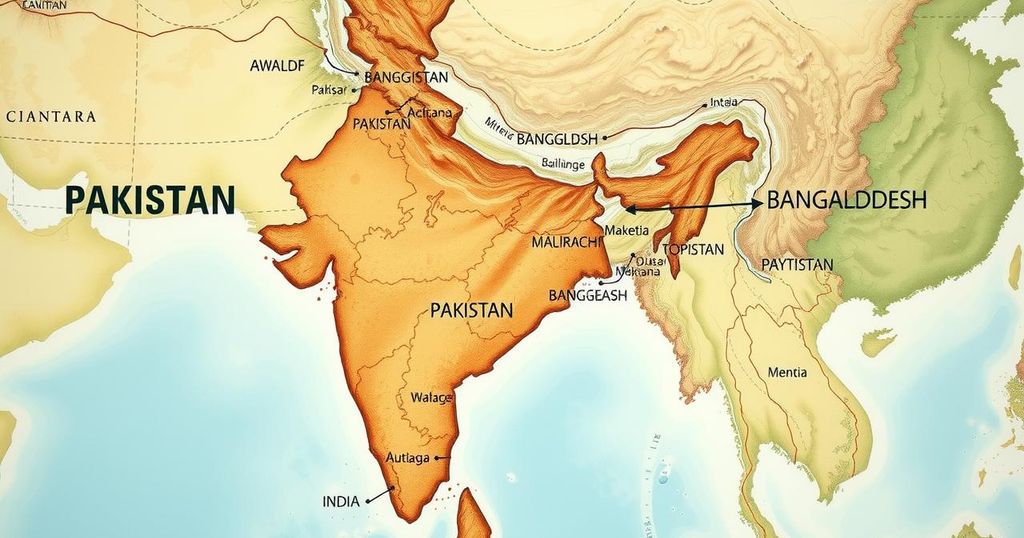Global news
' S, ASIA, AYE, AYESHA SIDDIQA, BANGLADESH, BANGLADESH NATIONALIST PARTY, BNP, COLLEGE, DELHI, DHAKA, DIPLOMACY, EAST PAKISTAN, EUROPE, FOREIGN POLICY, HAS, HASINA, HUM, HUMAYUN KABIR, INDIA, INTERNATIONAL RELATIONS, ISLAMABAD, KING ’ S COLLEGE, LONDON, MUHAMMAD YUNUS, PAKISTAN, SHE, SHEIKH HASINA, UNITED KINGDOM
Jamal Walker
0 Comments
Bangladesh-Pakistan Relations Thaw Amidst Historical Tensions and Watchful India
Bangladesh and Pakistan are witnessing a thaw in relations following political changes in Bangladesh. Direct trade has commenced, along with military collaborations, signaling a shift after years of strained ties. This development is being watched closely by India, which views it as a potential security concern, while also recognizing the economic advantages of improved bilateral relations. Historical grievances from the 1971 independence war complicate this budding relationship.
Recent political developments in Bangladesh have led to a surprising warming of relations with Pakistan, a former adversary. Following the ousting of Prime Minister Sheikh Hasina last year, Bangladesh initiated direct trade with Pakistan, importing 50,000 tonnes of rice. The two nations have also resumed direct flights, simplified visa processes, and increased military cooperation, indicating a shift in diplomatic dynamics that had been strained for decades.
Historically, Bangladesh and Pakistan share a painful past stemming from the 1971 independence struggle, which was heavily supported by India. Although relations improved from 2001 to 2006 under a previous coalition government, Hasina’s administration from 2009 maintained a distance from Pakistan until her recent political challenges prompted a thawing of ties.
Humayun Kabir, a former senior Bangladeshi diplomat, remarked, “For the past 15 years, the Pakistan-Bangladesh relationship was on a slightly difficult trajectory,” indicating a potential return to a more normalized status between the two nations. As relations between Dhaka and Delhi cool, India’s interest in the dynamics of emerging Bangladesh-Pakistan ties is growing, particularly given its historically tense relations with Islamabad.
The current resurgence in ties is speculated to possess strategic implications, with experts noting a collaborative effort for a united front against Indian dominance. Ayesha Siddiqa, a prominent Pakistani academic, noted, “Pakistan and Bangladesh have a tactical relationship at the moment. Together, they want to represent a pushback against the dominance of India.”
In addition to trade, there have been significant developments in military relations, including a rare visit by a Bangladeshi military delegation to Pakistan to meet Army Chief General Asim Munir. This renewed military collaboration raises security concerns for India, especially as the Bangladeshi navy participated in a recent maritime exercise organized by Pakistan.
Veena Sikri, a former Indian high commissioner to Bangladesh, likened this rekindling of ties to a “déjà vu” moment, recalling India’s previous concerns regarding insurgent groups supported by the ISI in Bangladesh. She indicated, “The revival of military ties between Bangladesh and Pakistan is a major security concern for India.”
Despite these developments, Bangladesh maintains its strategic communication to prevent an outright anti-India stance due to cultural and economic ties. Diplomats argue that effective normalization of Bangladesh-Pakistan relations hinges on addressing issues connected to the traumatic 1971 war, for which Bangladesh seeks a formal apology from Pakistan.
As discussions unfold, former military officers like Ikram Sehgal have highlighted the need for both nations to acknowledge their past transgressions. Additionally, economists advocate for enhanced trade relations, emphasizing the potential benefits to bilateral trade that could arise from improved diplomatic relations. Currently, trade levels are low, indicating that both nations could benefit economically from a stronger partnership.
Looking ahead, with upcoming elections in Bangladesh, shifts in foreign policy priorities may occur, and Pakistani Foreign Minister Ishaq Dar is expected to engage with his Bangladeshi counterparts to address ongoing issues. For India, fostering a stable Bangladesh remains crucial for regional peace and stability.
In conclusion, the recent thawing of relations between Bangladesh and Pakistan reflects significant political shifts and strategic maneuvers, particularly following the political upheaval in Bangladesh. As both nations explore avenues for trade and military cooperation, the repercussions for regional stability, especially concerning India, remain substantial. Navigating the complex historical grievances will be vital for achieving genuinely normalized ties between Dhaka and Islamabad. Economically, the potential growth in bilateral trade presents opportunities that both countries could leverage, provided they engage constructively in addressing their contentious pasts.
Original Source: www.bbc.com




Post Comment